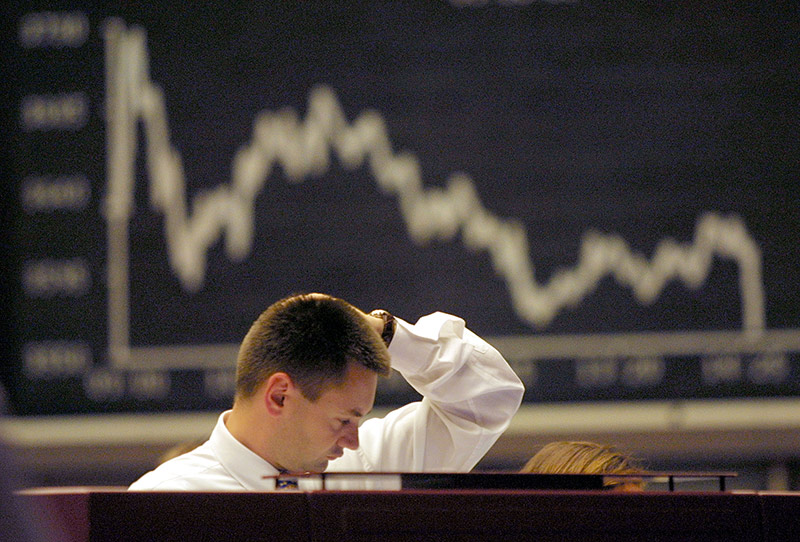德国正盘旋在衰退边缘,这是欧洲所有人的大麻烦

|
欧洲的引擎——德国正在熄火。它可能会让整个欧洲大陆一并趴窝。 由于陷入全球贸易战的夹击,又因英国脱欧的不确定性而受到严重影响,严重依赖出口的德国经济毫不意外地在第二季度收缩了0.1%,而且似乎看不到任何缓和的迹象。Capital Economics的安德鲁·肯宁厄姆对路透社(Reuters)表示,“总之,德国经济正徘徊在衰退边缘。” 德国制造业全线下滑,汽车行业尤其低迷,跌至2009年大衰退最严重时期以来的最低点。 德国联邦统计局(German Federal Statistics Office)将全年经济增长预期下调至0.5%,这个欧盟最大的经济体因此成为又一个欧洲病夫。尽管分析师对糟糕的数字早有预期,但这一消息还是让投资者进行了抛售。欧洲主要交易所下跌,德国DAX指数早盘下跌近0.5%,随后有所回升。10年期政府公债跌至负值,-0.624%的数据为史上最低。 不过,欧元在早盘交易中保持坚挺。德国的经济表现通常是欧元区经济状况的风向标,其GDP数据为欧元区未来几个月将如何管理财政政策提供了一个很好的指标。 目前外界普遍预计,欧洲央行(European Central Bank)将不得不在9月份的会议上发挥更大的创造力,推出新的刺激措施,防止欧元区进入衰退。在即将离任的欧洲央行行长马里奥·德拉吉主持的最后一次会议上,可能会推出新一轮降息和/或购买债券。 欧洲央行任何此类举措都可能给欧元带来进一步的压力,此举可能会让欧洲进一步招致特朗普政府的指责。华盛顿这几个月一直在抱怨,称美国最大的贸易伙伴们正积极参与操纵汇率,试图以牺牲美国贸易平衡为代价提振出口。 不过,至少欧元的疲软部分可以归咎于各地的政治。欧元区第三大经济体意大利正面临一场危机,这场危机可能导致政府垮台,使市场进一步承压。意大利互不满意的联盟伙伴正摇摇晃晃地走向分裂,这也动摇了欧洲债券市场,挤压了欧元。下周,意大利是否将提前进行大选,罗马方面局势或许会更明朗。 如果马特奥·萨尔维尼领导的极右翼民族主义联盟党在新的选举中获胜,欧洲的经济可能远会更糟糕,而该党目前已经在意大利民调中领先。萨尔维尼长期对欧元和欧盟持怀疑态度,他希望通过减税和增加支出来对抗欧盟,此举几乎肯定会进一步增加意大利已经占GDP 130%的惊人债务。 而在以节俭著名的德国,一直面临着完全相反的问题——刺激支出不够。不过,这种情况也发生了变化。最新的经济数据显示,德国家庭和政府支出是本季度为数不多的亮点之一。但整体经济表现被通常十分可靠的贸易数据拖累了。德国联邦统计局在一份声明中表示:“外贸发展拖慢了经济增长,因为出口环比降幅大于进口。”(财富中文网) 译者:Agatha |
Germany, the engine of Europe, is sputtering. And it could take the continent down with it. Caught in the crossfire of a global trade war and paralyzed by an uncertain Brexit showdown, the export-heavy German economy, as expected, contracted 0.1% in the second quarter, and there doesn’t appear to be any relief in sight. “The bottom line is that the German economy is teetering on the edge of recession,” Andrew Kenningham of Capital Economics, told Reuters. German manufacturing was down across the board, with the auto sector seeing a particular slump, declining to its worst point since 2009, during the worst days of the Great Recession. The German Federal Statistics Office lowered its full-year forecast to 0.5%, making the EU’s largest economy its new sick man of Europe. Even though analysts expected the gloomy numbers, investors sold on the news. The major European exchange sank, with Germany’s DAX down nearly 0.5% in early trading, before recovering somewhat. The 10-year government bond sunk to a record low, further into negative territory, at –0.624%. The euro, however, held firm in early trading. Germany’s economic performance is usually the bellweather for the health of the eurozone, and its GDP numbers offer up a good indicator for how the bloc will manage fiscal policy in the months ahead. It’s now largely expected that the European Central Bank will have to get more creative at its September meeting, introducing new stimulus measures to keep the bloc from sliding into a recession. On the cards could be a fresh round of interest-rate cuts and/or bond purchases in what would be the last meeting helmed by outgoing ECB chief Mario Draghi. Any such move by the ECB would likely put further pressure on the euro, a move that could put Europe further in the Trump Administration’s dog house. Washington has been complaining for months that its biggest trading partners are actively engaged in currency manipulation tactics to try to goose exports at the expense of America’s trade balance. At least some of the euro’s weakness, though, can be blamed on local politics. Italy, the euro zone’s No. 3 economy, is facing a crisis that could sink the government and set markets further on edge. The country’s fractious coalition partners are heading for a rocky split, and that too has shaken Europe’s bond market and squeezed the euro. Next week there should be some clarity in Rome about whether the country is heading for snap elections. Europe’s economic fortunes could get much worse should Matteo Salvini’s far-right nationalist League party, already leading in the Italian polls, claim top spot in new elections. Salvini is a longtime euro- and EU-skeptic who wants to defy Brussels by cutting taxes and boosting spending, a move that would almost certainly add to the country’s staggering debt pile of more than 130% of GDP. In thrifty Germany, the problem has long been the opposite—not enough stimulus spending. That too though has changed though. The latest economic figures show that German household and government spending were among the few bright spots in the quarter. The usually reliable trade data though dragged on results. “The development of foreign trade slowed down economic growth because exports recorded a stronger quarter-on-quarter decrease than imports,” the statistics office said in a statement. |













